

CNIL Releases BYOD Guidelines. Security concerns and the need to increase cyber security measures have recently boosted the use of Bring Your Own Device (BYOD) policies in France.
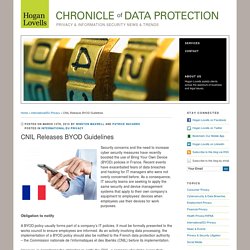
Recent events have exacerbated fears of data breaches and hacking for IT managers who were not overly concerned before. As a consequence, IT security teams are seeking to apply the same security and device management systems that apply to their own company’s equipment to employees’ devices when employees use their devices for work purposes. Obligation to notify A BYOD policy usually forms part of a company’s IT policies. It must be formally presented to the works council to ensure employees are informed.
However, in considering the obligation to notify the CNIL, a company should be aware that: Privacy concerns. SMS Professionnels Peuvent Être Consultés par l'Employeur. La Chambre commerciale de la Cour de cassation a rendu le 10 février 2015 un arrêt qui devrait intéresser les salariés envoyant et recevant des SMS sur des outils de communication électroniques mis à leur disposition par leur employeur.
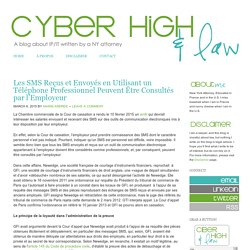
En effet, selon la Cour de cassation, l’employeur peut prendre connaissance des SMS dont le caractère personnel n’est pas indiqué. Pourtant, indiquer qu’un SMS est personnel est difficile, voire impossible. Il semble donc bien que tous les SMS envoyés et reçus sur un outil de communication électronique appartenant à l’employeur doivent être considérés comme professionnels, et, par conséquent, peuvent être consultés par l’employeur.
Dans cette affaire, Newedge, une société française de courtage d’instruments financiers, reprochait à GFI, une société de courtage d’instruments financiers de droit anglais, une «vague de départ simultanés» et d’avoir «débauché» nombreux de ses salariés, ce qui aurait désorganisé l’activité de Newedge. Les sms sur un mobile pro sont présumés professionnels Court Orders Plaintiff to Share Facebook Login Info with Defendant : Vogel Internet, Information Technology and e-Discovery Blog. A court recently ordered an accident victim to provide her “Facebook username email and password” to a defendant in an auto accident lawsuit.
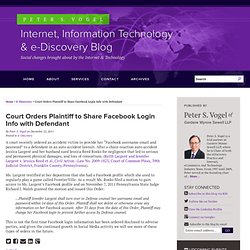
After a chain-reaction auto accident Jessica Largent and her husband sued Jessica Reed Rosko for negligence that led to serious and permanent physical damages, and loss of consortium. (Keith Largent and Jennifer Largent v. Jessica Reed et al, Civil Action –Law No. 2009-1823, Court of Common Pleas, 39th Judicial District, Franklin County, Pennsylvania).
Nurse Properly Fired and Denied Unemployment Due to Facebook Ran. Licenciement pour téléchargements illégaux et répétitif. Employers rights and duties. FR employers access to employee's email. Pitfalls and remedies for employees' internet use. Inappropriate e-mail use by employees can constitute cause for d. Employers and skl demand access to SM password. Employer privacy FB. An employer is free to view an employee’s personal USB flash dri.
Harvard's Secret E-Mail Search: The Intersection of Internal Investigations and Digital Privacy. Earlier this week, Harvard University acknowledged the fact that, in the wake of last summer’s cheating scandal that rocked the campus, it had secretly searched the e-mail accounts of 16 Resident Deans.
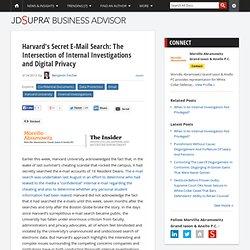
Battle Over LinkedIn Account Between Employer and Employee Largely Gutted. California Governor Jerry Brown signs new social media legislation. California Governor Jerry Brown announced on Twitter, Facebook, Google+, LinkedIn and MySpace today that he has signed two bills (Senate Bill 1349 and Assembly Bill 1844) prohibiting public and private postsecondary schools and California employers from requiring applicants and employees to provide their social media account passwords.
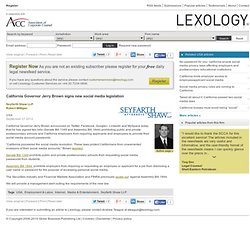
“California pioneered the social media revolution. These laws protect Californians from unwarranted invasions of their social media accounts,” Brown tweeted. Register. Mozilla Firefox Start Page. Court of Appeal recognizes reasonable expectation of privacy in contents of work computer : Canadian Technology & IP Law. In a judgment released last week, the Ontario Court of Appeal held that the appellant teacher had a reasonable expectation of privacy with respect to personal files stored on his work laptop.
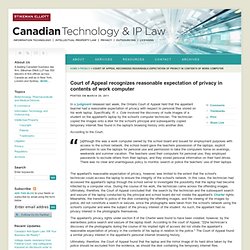
Specifically, R. v. Cole involved the discovery of nude images of a student on the appellant's laptop by the school's computer technician. The technician copied the images onto a disk for the school's principal and subsequently copied temporary internet files found in the laptop's browsing history onto another disk. According to the Court, [a]lthough this was a work computer owned by the school board and issued for employment purposes with access to the school network, the school board gave the teachers possession of the laptops, explicit permission to use the laptops for personal use and permission to take the computers home on evenings, weekends and summer vacation. Regulating the Use of Social Media Data. If you were to walk into my office, I’d have a pretty decent sense of your gender, your age, your race, and other identity markers.
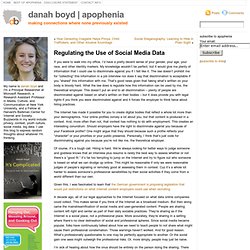
Germany to Pass Privacy Law to Limit the use of Facebook when Hiring - Will Ireland Follow? : Ireland IP & Technology Law Blog. The German Government has presented a draft law governing workplace privacy.
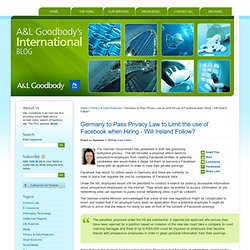
The bill includes a proposal which restricts prospective employers from viewing Facebook profiles of potential candidates and would make it illegal for them to become a Facebook friend with an applicant in order to view their private postings. Facebook has about 10 million users in Germany and there are currently no rules in place that regulate the use by companies of Facebook data. Under the bill, employers would still be permitted to conduct a search for publicly accessible information about prospective employees on the internet.
They would also be entitled to access information on job networking sites (as opposed to purely social networking sites) such as LinkedIn. Info/Law » Finnish Employers Cannot Google Applicants. There has been tons of discussion, on this blog and more generally, about the great degree to which our private information is now available on the internet to anyone who cares to look (on our blog alone, see e.g.
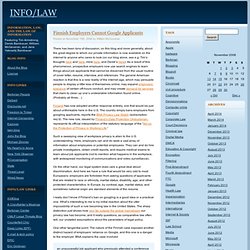
Tim’s thoughts here and here, mine here, and Derek’s here). As a result of this phenomenon, prospective employers now use search engines to learn things about job applicants that cannot be discerned from the usual routine of cover letter, resume, interview, and references. ICO issues guidance on disclosing employee personal data under FOI. The Information Commissioner's Office (ICO) said that public sector bodies must assess whether they could avoid disclosing some information about employees whilst still ensuring that "the legitimate interests" of those requesting the information are observed.
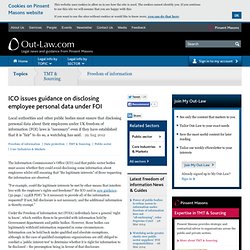
"For example, could the legitimate interests be met by other means that interfere less with the employee’s rights and freedoms? " the ICO said in new guidance. (32-page / 155KB PDF) "Is it necessary to provide all of the information requested? If not, full disclosure is not necessary, and the additional information is thereby exempt. "